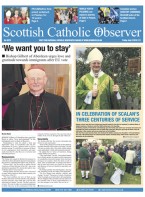March 4 | ![]() 0 COMMENTS
0 COMMENTS ![]() print
print

Recognising the cries of finitude
Fr Ronald Rolheiser
What most moves your heart? I was asked this question recently at a workshop. We were asked to respond to this question: When do you most naturally feel compassion in your heart? For me, the answer came easily. I am most moved when I see helplessness, when I see someone or something helpless to tend to its own needs and to protect its own dignity. It might be a baby, hungry and crying, too little to feed itself and to safeguard its own dignity. It might a woman in a hospital, sick, in pain, dying, helpless to get better, also unable to attend to her own dignity. It might be an unemployed man, down on his luck, unable to find work, the odd man out when everyone else seems to be doing great. It might be a little girl on the playground, helpless as she is teased and bullied, suffering indignity. Or it might just be a baby kitten, hungry, helpless, pleading with its eyes, unable to speak or attend to its own need. Helplessness tugs at the heart. I am always touched in the softest place inside me by helplessness, by the pleading of finitude. I suspect we all are.
We’re in good company. This is what moved Mary, Jesus’ mother, at the Wedding Feast of Cana to go over to Jesus and say: “They have no wine!” Her request here has different layers of meaning. At one level, it is a very particular request at a particular occasion in history; she is trying to save her hosts at a wedding from embarrassment, from suffering an indignity. No doubt the shortage of wine was due to some poverty on their part, either a shortage of money or a shortage of good planning, but, either way, they stood to be embarrassed before their guests. But, as with most things in the Gospels, this incident has a deeper meaning. Mary isn’t just speaking for a particular host on a particular occasion. She’s also speaking universally, as the mother of humanity, Eve, voicing for all of us what John Shea so aptly calls, “the cries of finitude.”
What is finitude? The finite, as we can see from the word itself, contrasts itself to the infinite, to what is not limited, to God. God, alone, is not finite. God, alone, is self-sufficient. God, alone, is never helpless, and God, alone, never needs help from anyone else. Only God is never subject to sickness, hunger, tiredness, irritation, fatigue, bodily and mental diminishment, and death. God, alone, never has to suffer the indignity of need, of getting caught short, of inadequate self-expression, of not measuring up, of being embarrassed, of being bullied, of being unable to help Himself, and of having to beg silently with His eyes for someone to come and help.
Everything else is finite. Thus, as humans, we are subject to helplessness, illness, lameness, blindness, hunger, tiredness, irritation, diminishment, and death. Moreover, within all these, we are also subject to indignity. So many of our words and actions are, in the end, cries of finitude, cries for assistance, the cries of a baby for food, for warmth, for protection, and for a safeguard from indignity. Although we are infinitely more sophisticated in our humanity, we are all still, at one level, the baby kitten, pleading with our eyes for someone to feed us, and all the assertions of self-sufficiency of the rich, the strong, the healthy, the arrogant, and of those who seemingly need no help are in the end nothing other than attempts to keep helplessness at bay. Not matter how strong and self-sufficient we might believe ourselves to be, finitude and mortality admit of no exemptions. Tiredness, illness, diminishment, death, and painful hungers will eventually find us all. Our wine too will eventually run out. Hopefully someone like the Mother of Jesus will speak for us: They have no wine!
What is the lesson in this? A number of things: First, recognising our finitude can lead to a healthier self-understanding. Knowing and accepting our finitude can help quell a lot of frustration, restlessness, and false guilt in our lives. I once had a spiritual director, an elderly nun, who challenged me to live by this axiom: Fear not, you are inadequate. We need to forgive ourselves for our own limits, for the fact that we are human, finite, and are unable to provide ourselves and those around us all that we need. But inadequacy is a forgivable condition, not a moral fault.
Beyond forgiving ourselves for our helplessness, recognising and accepting our finitude should challenge us too to hear more clearly the cries of finitude around us. And so whether it’s the cry of a baby, the humiliation in the eyes of someone looking for work, the ravaged eyes of the terminally ill patient, or simply the pleading eyes of a young kitten, we need, like Mary, to take up their cause and ensure that someone spares them from indignity by changing their water into wine, by calling out: They have no wine!
— Fr Ronald Rolheiser is a priest and member of the Missionary Oblates of Mary Immaculate. He is president of the Oblate School of Theology in San Antonio, Texas. Visit his website at www.ronrolheiser.com











